Building a zero copy parser
While implementing a RTSP parser I thought about using the excellent http_parser from Joyent. Although this is a very well programmed library I wanted to have a rtsp reader w/o any dependencies. Also, the project for which I'm developing RTSP reader is completely managed by myself, so I can make sure that I'm not sending any silly bytes to the parser which means I don't have to bulid in extra safety checks.
Normally when I implement a simple parser for e.g. parsing http headers I use C++ std::string and find, split, and trim like features; though this time I wanted to implement a parser which tries not to make any memory allocations.
So what does that mean? Well, basically while parsing you only keep
track of the start and end bytes of the information you want to
extract. This means that strings that you parsed won't be
null-terminated and can't be printed using printf() w/o using the
%.*s format.
While implementing this I realised that implementing a zero copy parser is a lot simpler then I expected. In my implementation I take the following approach.
- I parse byte per byte
- I create separate loops for data extraction
- I keep generic static
Parsing byte per byte
The first point seems pretty clear. I iterate over the buffer and
check byte per byte if I need to stop parsing, change state etc..
Basically this means I have one main while loop which does the
following, where dx is the current byte index (default 0) and
nbytes is the number of bytes in the buffer.
while (dx < nbytes) { // Parse... }
Separate loops for data extraction
The second point from the above list is the most interesting part to
explain in more in detail. So I create a loop for data extraction.
When you create a loop while parsing, you always need to make sure
that you use a condition which checks that you're not reading
outside the buffer, this can simply be done by doing: for(; dx <
nbytes; ++dx) But you don't only want to check if you're reading
outside the buffer; you also want to check for some character which
marks the end of the data you want to extract.
For example, consider the following lines:
Content-Type: application/sdp\r\n CSeq: 2\r\n User-Agent: Lavf56.11.0\r\n Content-Length: 307\r\n
Okay lets start with the first line, Content-Type: application/sdp\r\n.
To extract the header name, we scan until we find the ':' character. Now,
we basically have two end-conditions; lets create the loop. dx is the
current read position.
size_t field_start = dx; size_t field_end = dx; for (; dx < nbytes; ++dx) { if (data[dx] == ':') { dx += 1; // we jump over the ":" character. break; } field_end = dx; }
The above loop is a simple and readable approach to parsing sections
from a buffer, byte per byte. We read as long as there are enough
bytes available dx < nbytes. If the current character is our end
character we stop and break out our loop. If not we update the end
position.
So a more semantic pseudo code example:
size_t field_start = dx; size_t field_end = dx; while "there are bytes available" do if "current byte is the end byte" read_index = read_index + 1; break; endif field_end = read_index; read_index = read_index + 1; end while
What if we want to check for multiple end characters?
In the case of parsing http headers we need to check for the \r\n
character sequence which marks the end of a header line. To parse
this we need to change the above loop a little bit. We simply peek
not only at the current character, but also the next one. Therefore
our end condition needs to be dx < (nbytes - 1). If we need to
check two bytes ahead, we do dx < (nbytes - 2), etc..
field_start = dx; for (; dx < nbytes - 1; ++dx) { if (data[dx] == '\r' && data[dx + 1] == '\n') { dx += 2; // we want to jump over the \n break; } field_end = dx; }
This appraoch can be used for any 'data' that you want to extract
from a byte stream. In the above text I did not mention that you
also want to keep track of the start position where your data begins,
see field_start.
Keeping state and number of bytes parsed
The last part of my approach is how I keep state while parsing. Let me first explain why I keep state before jumping into details. When parsing some data you want to keep state so that you can handle buffers which do not contain complete chunks of parseable data which may occur when you're e.g. reading from the network, or when you're reading chunks from a file. For example, it's possible that when you're parsing a HTTP request you first receive the method line then some headers and then some body data. Because you don't want to parse the whole buffer from the start, when you receive data, you keep track of what parts you've parsed. In my RTSP reader, I keep track if I parsed the method line, the headers and the body. This does mean that when I have 5 reads before the end-of-headers is detected, the parser stays in the header-parsing-state. But this doesn't mean that I parse the same data over and over again. To make sure that, while you're in a specfic state, you don't keep parsing the same bytes over and over again, you also want to keep track of the number of bytes that you parsed. Every time you're ready with parsing a complete piece of data, you update the number of bytes parsed and let the user know how many bytes he can flush from the buffer. This is why my parsing functions look like:
int parse(const char* data, size_t nbytes, size_t& nparsed);
The code below shows how I'm keeping track of state and how I'm updating the number of bytes. This code parser basic RTSP headers and is created only to explain the methods I described above.
RtspReader.h
class RtspReader { public: RtspReader(); int init(RtspReaderListener* lis); int parse(const char* data, size_t nbytes, size_t& nparsed); public: RtspReaderListener* listener; int state; int method; uint64_t cseq; /* @toto what's the max? */ };
#include <sstream> #include <stdio.h> #include <algorithm> #include <RtspReader.h> #include <poly/Log.h> #if defined(__APPLE__) # define strnicmp(a, b, n) strncasecmp(a, b, n) #endif namespace poly { RtspReader::RtspReader() :listener(NULL) ,state(RTSP_RSTATE_NONE) ,method(RTSP_METHOD_NONE) ,cseq(0) { } int RtspReader::init(RtspReaderListener* lis) { if (NULL == lis) { SX_ERROR("Cannot initialize the rtsp reader because the given listener is NULL."); return -1; } listener = lis; return 0; } int RtspReader::parse(const char* data, size_t nbytes, size_t& nparsed) { size_t j = 0; size_t field_start = 0; size_t field_end = 0; size_t val_start = 0; size_t val_end = 0; size_t method_start = 0; size_t method_end = 0; size_t len = 0; size_t uri_start = 0; size_t uri_end = 0; size_t version_start = 0; size_t version_end = 0; size_t dx = 0; nparsed = 0; if (NULL == listener) { SX_ERROR("Cannot parse the given data because the listener is not set."); return -1; } if (NULL == data) { SX_ERROR("Cannot parse RTSP because given data is NULL."); return -1; } if (0 == nbytes) { SX_ERROR("Cannot parse RTSP because given data length is 0."); return -2; } while (dx < nbytes) { if (RTSP_RSTATE_NONE == state) { /* Reset */ method = RTSP_METHOD_NONE; cseq = 0; /* REQUEST-LINE */ { /* method */ method_start = dx; for (; dx < nbytes; ++dx) { if (data[dx] == ' ') { dx = dx + 1; break; } method_end = dx; } /* URI */ uri_start = dx; for (; dx < nbytes - 1; ++dx) { if (data[dx] == ' ') { dx = dx + 1; break; } uri_end = dx; } /* RTSP/1.0 */ version_start = dx; for (; dx < nbytes - 1; ++dx) { if (data[dx] == '\r' && data[dx + 1] == '\n') { field_end = dx ; dx = dx + 2; nparsed = dx; state = RTSP_RSTATE_METHOD; len = 1 + method_end - method_start; if (0 == strnicmp(data + method_start, "OPTIONS", std::min<size_t>(len, 7))) { method = RTSP_METHOD_OPTIONS; } else if (0 == strnicmp(data + method_start, "DESCRIBE", std::min<size_t>(len, 7))) { method = RTSP_METHOD_DESCRIBE; } else if (0 == strnicmp(data + method_start, "ANNOUNCE", std::min<size_t>(len, 8))) { method = RTSP_METHOD_ANNOUNCE; } else if (0 == strnicmp(data + method_start, "SETUP", std::min<size_t>(len, 5))) { method = RTSP_METHOD_SETUP; } else if (0 == strnicmp(data + method_start, "PLAY", std::min<size_t>(len, 4))) { method = RTSP_METHOD_PLAY; } else if (0 == strnicmp(data + method_start, "PAUSE", std::min<size_t>(len, 5))) { method = RTSP_METHOD_PAUSE; } else if (0 == strnicmp(data + method_start, "TEARDOWN", std::min<size_t>(len, 8))) { method = RTSP_METHOD_TEARDOWN; } else if (0 == strnicmp(data + method_start, "GET_PARAMETER", std::min<size_t>(len, 13))) { method = RTSP_METHOD_GET_PARAMETER; } else if (0 == strnicmp(data + method_start, "SET_PARAMETER", std::min<size_t>(len, 13))) { method = RTSP_METHOD_SET_PARAMETER; } else if (0 == strnicmp(data + method_start, "REDIRECT", std::min<size_t>(len, 8))) { method = RTSP_METHOD_REDIRECT; } else if (0 == strnicmp(data + method_start, "RECORD", std::min<size_t>(len, 6))) { method = RTSP_METHOD_RECORD; } else { method = RTSP_METHOD_NONE; } listener->onRtspReaderMethod(method); break; } } } } else if (RTSP_RSTATE_METHOD == state) { /* HEADERS */ field_start = dx; for(; dx < nbytes; ++dx) { if (data[dx] == ':') { dx = dx + 1; break; } field_end = dx; } /* remove any spaces between : and value. */ while (dx < nbytes && data[dx] == ' ') { dx++; } val_start = dx; /* Field value. */ for(; dx < nbytes - 1; ++dx) { if (data[dx] == '\r' && data[dx + 1] == '\n') { dx = dx + 2; nparsed = dx + 1; if (len >= 4 && 0 == strnicmp(data + field_start, "CSEQ", 4)) { std::stringstream ss(std::string(data + val_start, 1 + (val_end - val_start))); ss >> cseq; } listener->onRtspReaderHeader(data + field_start, 1 + (field_end - field_start), data + val_start, 1 + (val_end - val_start)); break; } val_end = dx; } /* last line? */ if (dx < (nbytes - 1) && data[dx + 0] == '\r' && data[dx + 1] == '\n') { dx = dx + 1; nparsed = dx + 1; state = RTSP_RSTATE_HEADERS; listener->onRtspReaderHeadersComplete(); break; } } else { break; } } /* while */ return 0; } } /* namespace poly */

 NAT Types
NAT Types
 Building Cabinets
Building Cabinets
 Compiling GStreamer from source on Windows
Compiling GStreamer from source on Windows
 Debugging CMake Issues
Debugging CMake Issues
 Dual Boot Arch Linux and Windows 10
Dual Boot Arch Linux and Windows 10
 Mindset Updated Edition, Carol S. Dweck (Book Notes)
Mindset Updated Edition, Carol S. Dweck (Book Notes)
 How to setup a self-hosted Unifi NVR with Arch Linux
How to setup a self-hosted Unifi NVR with Arch Linux
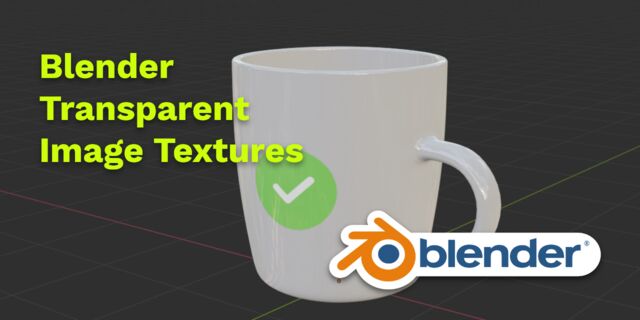 Blender 2.8 How to use Transparent Textures
Blender 2.8 How to use Transparent Textures
 Compiling FFmpeg with X264 on Windows 10 using MSVC
Compiling FFmpeg with X264 on Windows 10 using MSVC
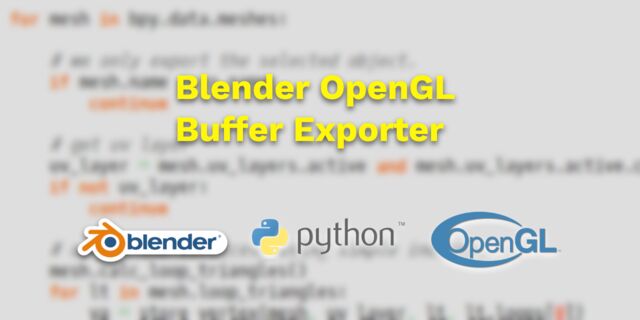 Blender 2.8 OpenGL Buffer Exporter
Blender 2.8 OpenGL Buffer Exporter
 Blender 2.8 Baking lightmaps
Blender 2.8 Baking lightmaps
 Blender 2.8 Tips and Tricks
Blender 2.8 Tips and Tricks
 Setting up a Bluetooth Headset on Arch Linux
Setting up a Bluetooth Headset on Arch Linux
 Compiling x264 on Windows with MSVC
Compiling x264 on Windows with MSVC
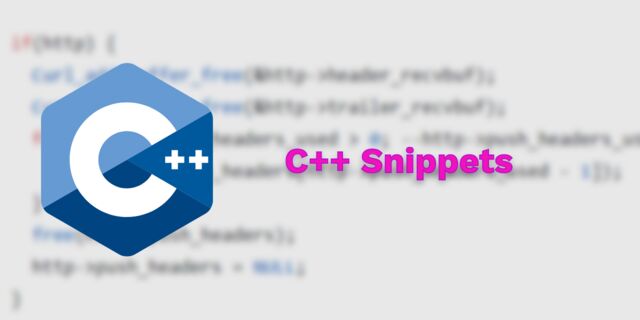 C/C++ Snippets
C/C++ Snippets
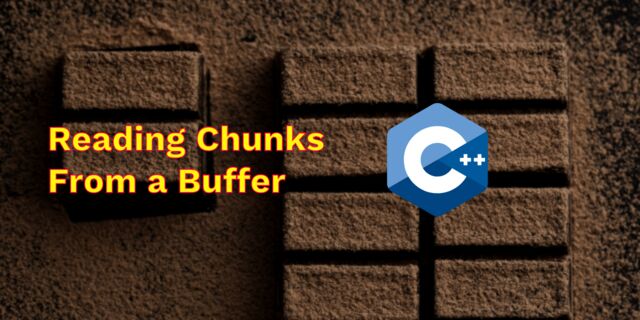 Reading Chunks from a Buffer
Reading Chunks from a Buffer
 Handy Bash Commands
Handy Bash Commands
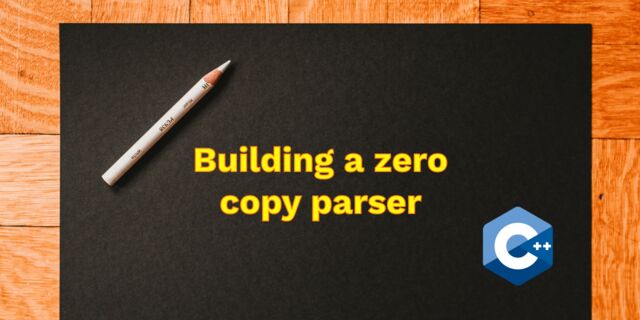 Building a zero copy parser
Building a zero copy parser
 Kalman Filter
Kalman Filter
 Saving pixel data using libpng
Saving pixel data using libpng
 Compile Apache, PHP and MySQL on Mac 10.10
Compile Apache, PHP and MySQL on Mac 10.10
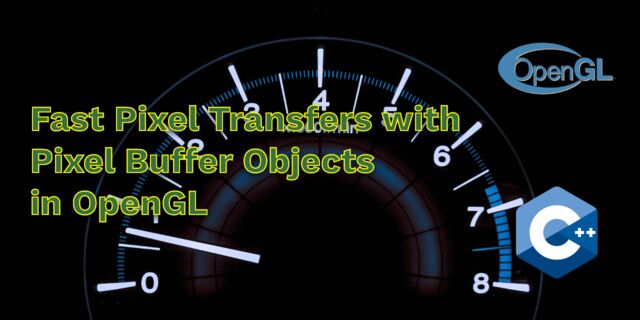 Fast Pixel Transfers with Pixel Buffer Objects
Fast Pixel Transfers with Pixel Buffer Objects
 High Resolution Timer function in C/C++
High Resolution Timer function in C/C++
 Rendering text with Pango, Cairo and Freetype
Rendering text with Pango, Cairo and Freetype
 Fast OpenGL blur shader
Fast OpenGL blur shader
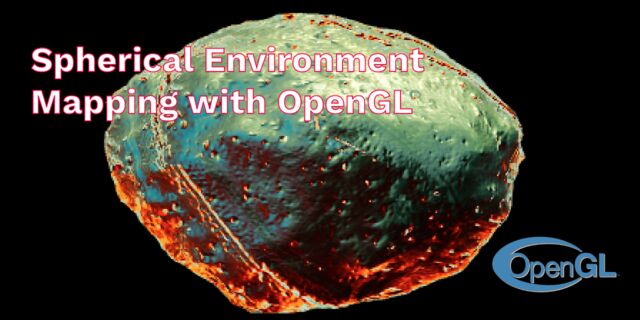 Spherical Environment Mapping with OpenGL
Spherical Environment Mapping with OpenGL
 Using OpenSSL with memory BIOs
Using OpenSSL with memory BIOs
 Attributeless Vertex Shader with OpenGL
Attributeless Vertex Shader with OpenGL
 Circular Image Selector
Circular Image Selector
 Decoding H264 and YUV420P playback
Decoding H264 and YUV420P playback
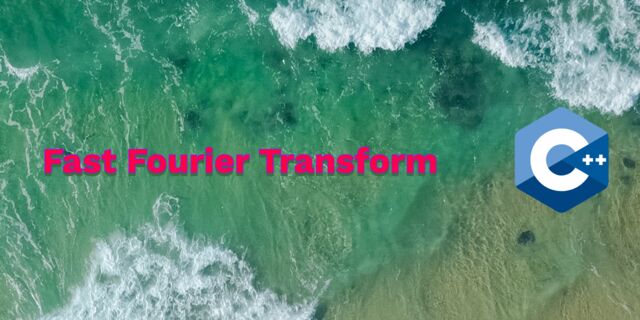 Fast Fourier Transform
Fast Fourier Transform
 OpenGL Rim Shader
OpenGL Rim Shader
 Rendering The Depth Buffer
Rendering The Depth Buffer
 Delaunay Triangulation
Delaunay Triangulation
 RapidXML
RapidXML
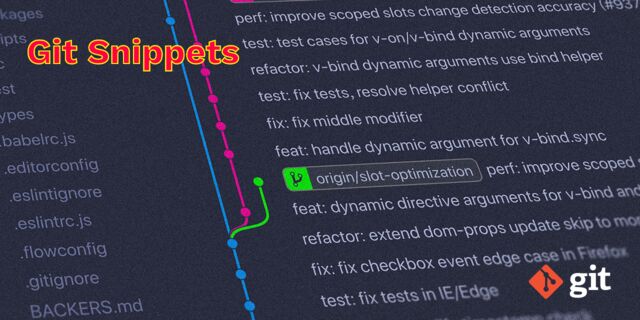 Git Snippets
Git Snippets
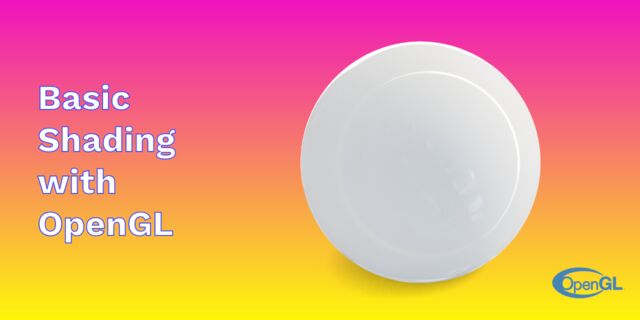 Basic Shading With OpenGL
Basic Shading With OpenGL
 Open Source Libraries For Creative Coding
Open Source Libraries For Creative Coding
 Bouncing particle effect
Bouncing particle effect
 OpenGL Instanced Rendering
OpenGL Instanced Rendering
 Mapping a texture on a disc
Mapping a texture on a disc
 Download HTML page using CURL
Download HTML page using CURL
 Height Field Simulation on GPU
Height Field Simulation on GPU
 OpenCV
OpenCV
 Some notes on OpenGL
Some notes on OpenGL
 Math
Math
 Gists to remember
Gists to remember
 Reverse SSH
Reverse SSH
 Working Set
Working Set
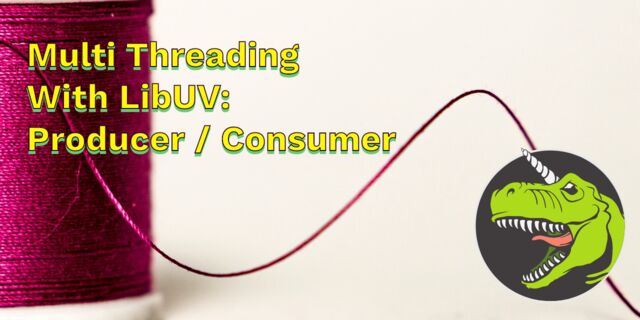 Consumer + Producer model with libuv
Consumer + Producer model with libuv
 Parsing binary data
Parsing binary data
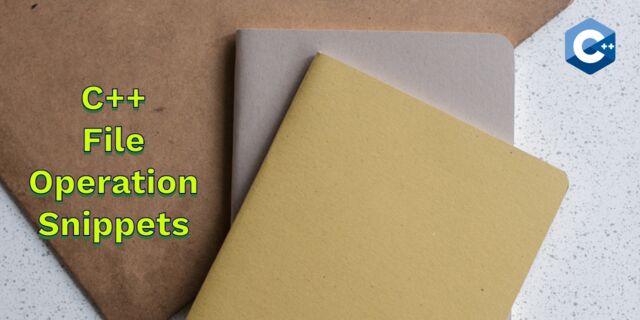 C++ file operation snippets
C++ file operation snippets
 Importance of blur with image gradients
Importance of blur with image gradients
 Real-time oil painting with openGL
Real-time oil painting with openGL
 x264 encoder
x264 encoder
 Generative helix with openGL
Generative helix with openGL
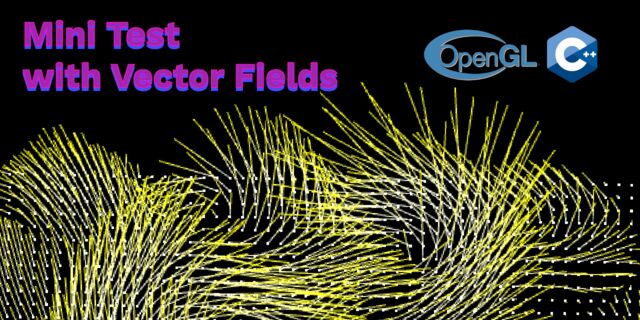 Mini test with vector field
Mini test with vector field
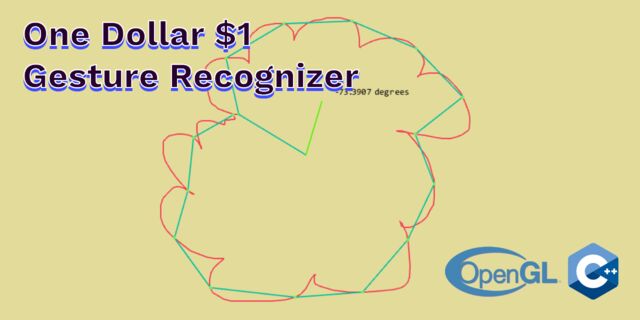 Protractor gesture recognizer
Protractor gesture recognizer
 Hair simulation
Hair simulation
 Some glitch screenshots
Some glitch screenshots
 Working on video installation
Working on video installation
 Generative meshes
Generative meshes
 Converting video/audio using avconv
Converting video/audio using avconv
 Auto start terminal app on mac
Auto start terminal app on mac
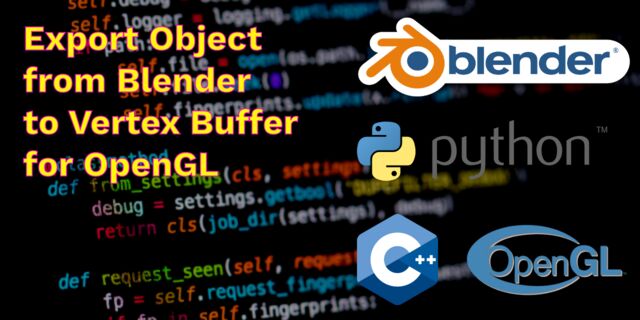 Export blender object to simple file format
Export blender object to simple file format